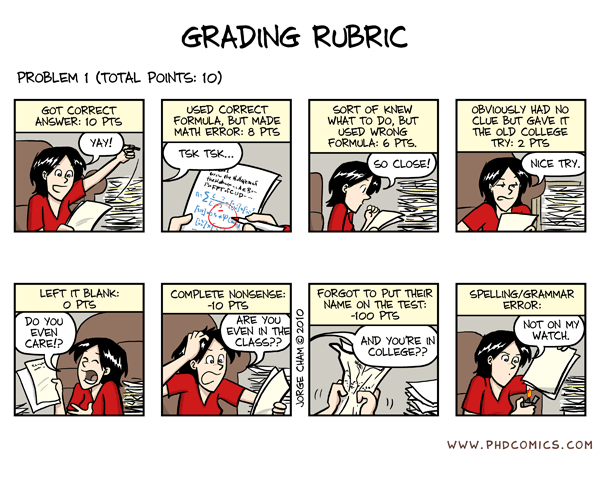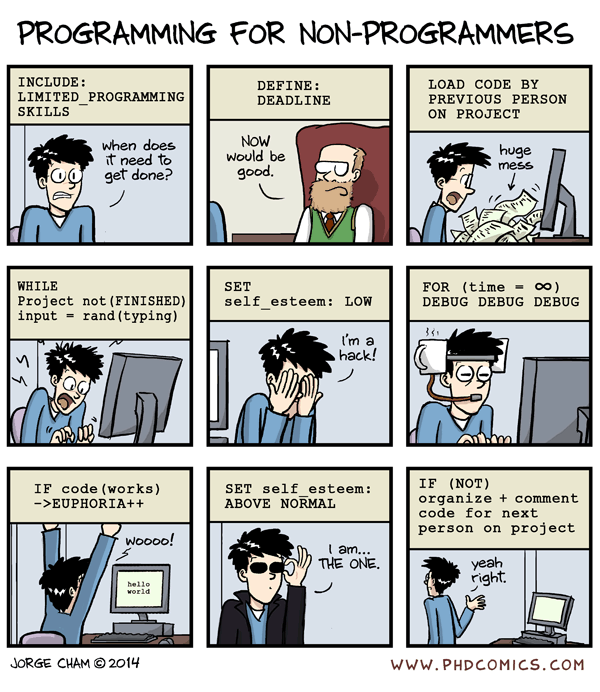This page is not an exhaustive list of everything I taught but rather a discussion of the specific courses
I designed since I joined USF in 2002, with a focus on those linked to my Computing Education Research agenda.
Each tab will discuss the courses I taught on this specific area.
All of the offerings in these pages have been initially taught in a face-to-face setting.
They evolved into an hybrid delivery, face-to-face & web, which supported my transition to
flipped classrooms.
They have then been adapted to online delivery, first synchronous, then asynchronous.
It has been quite interesting to get to transition the same learning objectives through this landscape of
diversified delivery modalities
Again, I will provide only a quick list on this page for now until I have some time to upload more material

I enjoy teaching programming at any level.
The courses below have been also an opportunity to conduct computing education research on the difficulties
encountered by novice programmers - see the CEReAL group website for details.
The teaching material is made available, along with papers and other information when it has been developed
as part of a NSF project.
Programming Fundamentals in Java
This is an introduction to programming for undergraduate students with no prior programming experience.
At USF, I have taught several variants under the following names;
- COP2510 Programming Concepts - for Ccomputer Science majors
- COP2930 IT Programming Concepts - for Information Technology majors while using a temporary special course number
- COP2512 IT Programming Fundamentals - for Information Technology majors
The latest version uses the fundamentals-first, aka objects-late, pedagogy but I have also experimented with
objects-first, using the excellent BlueJ environment.
While we use the Java programming language, I get students started with the syntax-free flowchart interpreter
Raptor during the first few weeks.
This led to some interesting findings regarding the impact of syntax-late pedagogy.
We then switch to Java with JGrasp to provide a good IDE support to students.
The material is available @
http://cereal.forest.usf.edu/edu/COP2512/.
Object Oriented Programming in Java
This course directly follows the above and supplements it by introducing students to object oriented techniques.
I will be teaching it for the first time at USF in Fall 2017 under the following name;
- COP2513 Object Oriented Programming for IT - for Information Technology majors
The material will be shortly available @
http://cereal.forest.usf.edu/edu/COP2513/.
Program Design
This is a 2nd or 3rd programming offering for undergraduate students. It focuses on the C programming language
as a way to strengthen their procedural programming skills while exposing them to a language
used in upper-level offerings oriented toward the system-level aspects of our discipline.
At USF, I taught several variants under the following names;
- COP3514 Program Design- for Computer Science majors
- COP3515 IT Program Design - for Information Technology majors
The material is available as part of the NSF CLUE project;
Advanced Object Oriented Programming
This course has been taught at USF for Information Technology majors as both a graduate course
in the Masters in IT, and an advanced undergraduate elective in the BS in IT programs.
It is an overview of advanced functional and object-oriented programming techniques & frameworks.
At USF, I taught it under the following names;
- CGS6425 Advanced Programming for IT
- CEN6084 Advances in Object Oriented Programming for IT
- COP4930 Advances in Object Oriented Programming for IT

Since I joined USF Information Technology program, a significant focus of my teaching has revolved around
operating systems and, in particular, Linux.
Besides the OS Principles undergraduate courses, this allowed me to also develop Linux Technologies, and System Administration
oriented courses and a BS IT specialization track.
This work also resulted in several computing education research papers and grants, see CEReAL website for details.
Operating Systems
Core undergraduate course on Operating systems for which I opted to leverage Linux as a semester-long case study.
At USF, I taught several variants under the names;
- COP4600 Operating Systems - for Computer Science majors
- COP4610 IT Operating Systems - for Information Technology majors
One of the main pedagogical innovation was to allow students to interact with kernel internals without having
to devote weeks to accustomize themselves with the kernel source tree as a whole. This is a barrier when using
a prodution-level OS like Linux in the labs, but it is still a significant hindrancec when using kernels designed
to be friendly to students such as Minix.
This was achieved by relying on Loadable Kernel Modules - LKMs. Students would learn about a kernel subsystem then
write small LKMs designed to interact with it; e.g.
- User-space file systems
- Drivers
- /proc subsystems
- LKMs intercepting system calls - back when it was easy to do so ;P
- ...
This allows us to focus on small pieces of kernel at a time and learn about them without actually modifying the
whole kernel source tree itself
Part of the material I used was developed under NSF funding so you might get an idea of what this offering is all about by looking into the
SOFTICE project.
User-Level Intro to Linux

This intro to Linux does not start students with system administration
but instead aims at making them advanced users first. This approach, while adhering to the
first exam of the LPI / Linux+ certifications, proved to be useful to a much wider range of students
who need to know how to work on the Linux platform without necessarily targeting sysadmin positions.
At USF, I taught several variants under the names;
- COP3931 User-Level Intro to Linux - using a temporary special course number
- COP3353 User-Level Intro to Linux - as we obtained a definitive new course number
Teaching material available @
http://cereal.forest.usf.edu/linux/L0/
Linux System Administration
I have developed a USF BSIT Linux Technologies specialization track, based on a collaboration
with Polk State College under NSF ATE funding.
Refer to the project website for more details @
http://cereal.forest.usf.edu/linux


